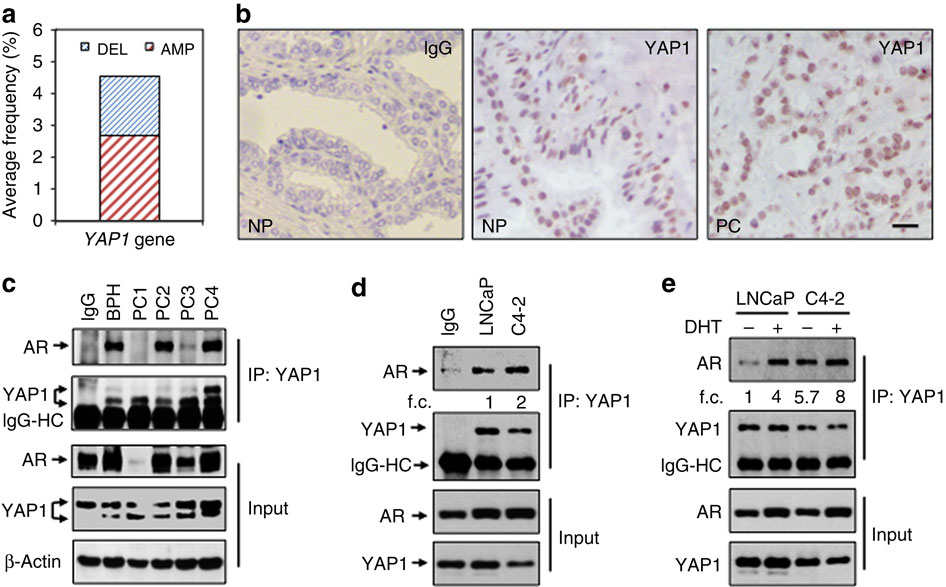当前位置:
X-MOL 学术
›
Nat. Commun.
›
论文详情
Our official English website, www.x-mol.net, welcomes your
feedback! (Note: you will need to create a separate account there.)
YAP1 and AR interactions contribute to the switch from androgen-dependent to castration-resistant growth in prostate cancer.
Nature Communications ( IF 14.7 ) Pub Date : 2015-Sep-01 , DOI: 10.1038/ncomms9126 Gamze Kuser-Abali , Ahmet Alptekin , Michael Lewis , Isla P. Garraway , Bekir Cinar
Nature Communications ( IF 14.7 ) Pub Date : 2015-Sep-01 , DOI: 10.1038/ncomms9126 Gamze Kuser-Abali , Ahmet Alptekin , Michael Lewis , Isla P. Garraway , Bekir Cinar

|
The transcriptional co-activator Yes-associated protein 1 (YAP1), a key nuclear effector of the Hippo pathway, is a potent oncogene, and yet, the interaction between YAP1 and androgen receptor (AR) remains unexplored. Here we identify YAP1 as a physiological binding partner and positive regulator of AR in prostate cancer. YAP1 and AR co-localize and interact with each other predominantly within cell nuclei by an androgen-dependent mechanism in a hormone naive and an androgen-independent mechanism in castration-resistant prostate cancer cells. The growth suppressor MST1 kinase modulates androgen-dependent and -independent nuclear YAP1-AR interactions through directly regulating YAP1 nuclear accumulation. Disruption of YAP1 signalling by genetic (RNAi) and pharmacological (Verteporfin) approaches suppresses AR-dependent gene expression and prostate cancer cell growth. These findings indicate that the YAP1-AR axis may have a critical role in prostate cancer progression and serves as a viable drug target.
中文翻译:

YAP1和AR交互作用有助于前列腺癌从雄激素依赖性生长向去势抵抗生长的转变。
转录共激活因子Yes相关蛋白1(YAP1)是Hippo途径的关键核效应子,是一种有效的癌基因,但是,YAP1和雄激素受体(AR)之间的相互作用尚待探索。在这里,我们确定YAP1为前列腺癌的生理结合伴侣和AR的正向调节剂。YAP1和AR主要通过天然的雄激素依赖性机制和去势抵抗性前列腺癌细胞中的雄激素非依赖性机制共定位并在细胞核中相互作用。生长抑制剂MST1激酶通过直接调节YAP1核积累来调节雄激素依赖性和非依赖性核YAP1-AR相互作用。通过遗传(RNAi)和药理学(Verteporfin)方法破坏YAP1信号传导可抑制AR依赖性基因表达和前列腺癌细胞的生长。这些发现表明,YAP1-AR轴可能在前列腺癌的进展中起关键作用,并成为可行的药物靶标。
更新日期:2015-09-04
中文翻译:

YAP1和AR交互作用有助于前列腺癌从雄激素依赖性生长向去势抵抗生长的转变。
转录共激活因子Yes相关蛋白1(YAP1)是Hippo途径的关键核效应子,是一种有效的癌基因,但是,YAP1和雄激素受体(AR)之间的相互作用尚待探索。在这里,我们确定YAP1为前列腺癌的生理结合伴侣和AR的正向调节剂。YAP1和AR主要通过天然的雄激素依赖性机制和去势抵抗性前列腺癌细胞中的雄激素非依赖性机制共定位并在细胞核中相互作用。生长抑制剂MST1激酶通过直接调节YAP1核积累来调节雄激素依赖性和非依赖性核YAP1-AR相互作用。通过遗传(RNAi)和药理学(Verteporfin)方法破坏YAP1信号传导可抑制AR依赖性基因表达和前列腺癌细胞的生长。这些发现表明,YAP1-AR轴可能在前列腺癌的进展中起关键作用,并成为可行的药物靶标。































 京公网安备 11010802027423号
京公网安备 11010802027423号